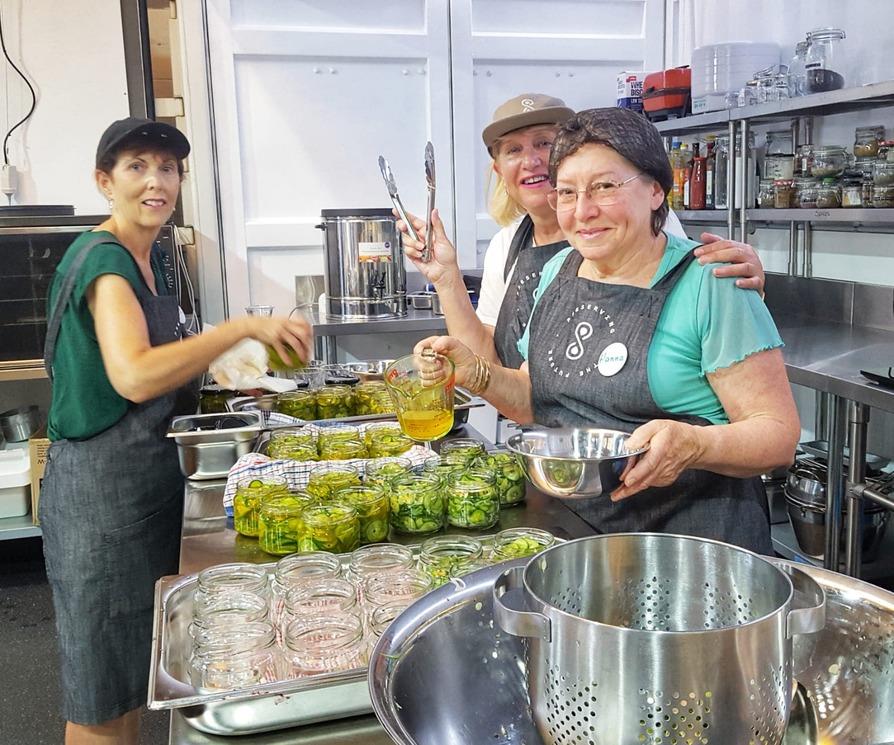
Case study: Monash Community Harvest
Project partner: The Corner Store Network
Region: Eastern Metro
Budget: $70,000.00
Votes: 263
Preserving the planet, one jar at a time
The idea for a community harvest program came to Alice Mahar, Founder and Director of The Corner Store Network, in 2017 when she was setting up a food preservation project in Timor-Leste.
“It became apparent that the same issues around food security and lack of access to food and food waste existed in Australia, even though the two countries are so vastly different.”
In Timor-Leste, farmers sell produce to ‘preservation hubs’ run by local employees who preserve the produce, making it available to the community at a low cost all year round.
“We have roughly 40% of food being wasted in Australia and on any given day many Australians are food insecure as well, so it seemed obvious to replicate the model here, but in a way that was more suitable to the Australian context,” explains Alice.
Although the model is designed to maintain itself, there are some costs involved in the initial set up. After a successful Pick My Project campaign, The Corner Store Network were able to deck out their shipping container in Oakleigh with flooring, a commercial-grade kitchen and electricity and plumbing. They also bought the necessary preserving equipment including boiling units, jars, bowls, knives, spices, vinegar and sugar.
Unlike the Timor-Leste model, the Monash preservery is reliant on locals donating excess harvests and on volunteers to do the preserving. But it didn’t take long for the community to catch on.
“It started with a small amount, but really quickly it gathered momentum and pace,” Alice says.
This is largely thanks to some unexpected, money-can’t-buy publicity. Late last year, Alice was announced as an Obama Foundation Leader for the Asia Pacific program. Then in January, Obama tweeted about Alice and how her program was responding to the bushfire crisis.
“There was a whole bunch of media that flowed from that, so that’s how we really ramped up,” Alice said. “Then we absolutely never found we had an issue with getting supply. It just shows you the amount of produce that is grown in people’s backyards.”
Some of the produce donors have also joined the group of around 80 volunteers, who keep the program afloat through weekly preserving sessions. Some of the preserves are then sold at markets to keep the program ticking over financially, with a portion returned to the grower and the rest donated to local relief agencies.
Alice initially began this project to reduce food waste and local food insecurity. Whilst it is certainly making a difference in those areas, it’s the community connections that are having a significant impact.
“It’s providing the opportunity for people to connect with other people and combat social isolation and loneliness. They’ve probably lived in the street next to or in the same area for years but would have never crossed paths, so that’s been a wonderful outcome,” says Alice.
The program has attracted people of all walks of life from retirees to a group of refugee women, volunteering before finding employment.
“We’ve seen a real shift in them, they’ve become more confident and had the chance to meet other people in the community, and that’s been really nice to see as well,” Alice says.
A lot of the volunteers have a shared interest in wanting action on climate change, social justice and inequality, but struggle to know how to contribute. Having the chance to take action through the program is empowering and is helping to build engaged and resilient communities.
While preserving sessions are temporarily on hold due to the restrictions in place from the pandemic, Alice is predicting a rise in the need for services like hers in the coming months.
“Food shortages are going to arise from this, as well as an increase in the cost of food because there’ll be lower imports and an unprecedented amount of people accessing the welfare system. We certainly hope to be able to be there for people to provide nutritious and high-quality food at a lower cost so that everybody has access.”
The Corner Store Network aims to expand, placing preserving hubs in more local communities across Australia. As is evident from the Timor-Leste model, this program can easily be adapted for any country – as long as there’s access to capital for the initial set up. Once that’s established, the sustainable model will simply maintain itself.
To see if there’s a preserving hub opening near you, follow The Corner Store Network on Facebook.
Date Published: 17 Jun 2020


